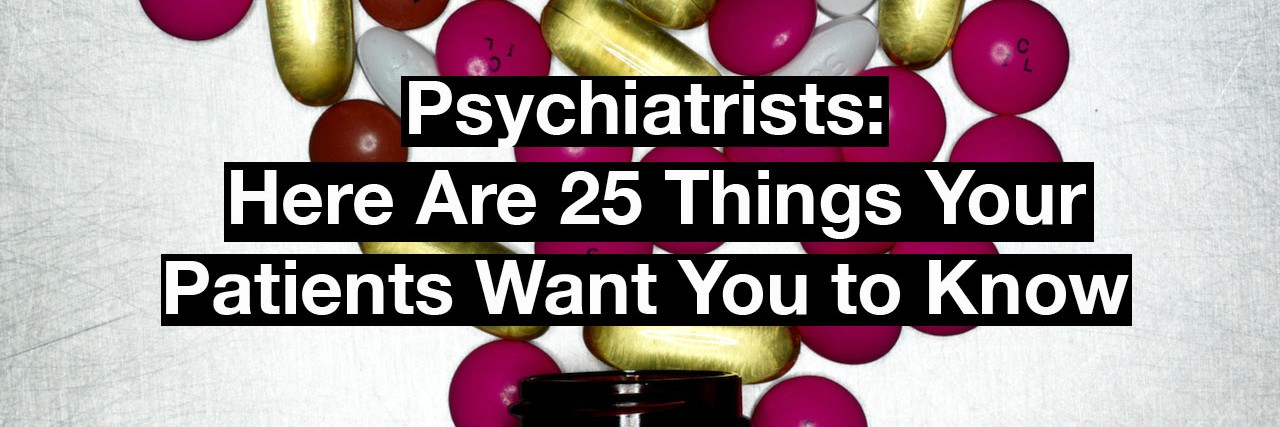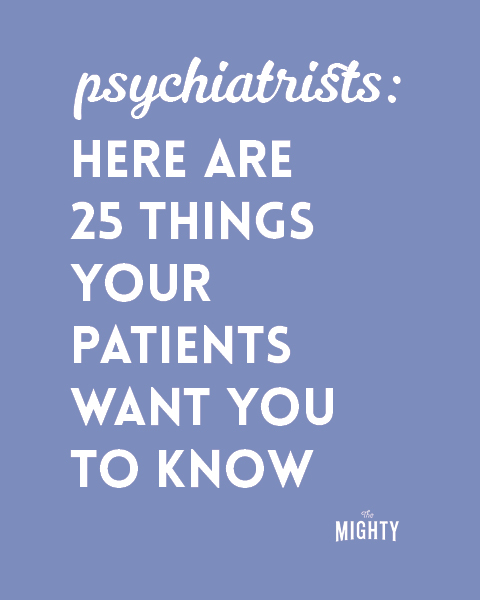Psychiatrists: Here Are 25 Things Your Patients Want You to Know
While medication can be an important part of managing a mental illness, finding the right medication — and finding the right psychiatrist to work with to find that medication — is a tricky business, and unfortunetly not everyone has a positive experience. That’s why we wanted to ask our mental health community to share one thing they wish their psychiatrist understood. People with mental illnesses need to be involved in their treatment and deserve to be heard.
So psychiatrists, listen up. Here’s what your patients wish you knew:
1. “Please don’t try to shove random pills down my throat without telling me what illnesses they’re supposed to help with or without giving me a full background on side effects.”
2. “A license/degree is nothing if you can’t listen, be forthcoming and use empathy.”
3. “I want to say thank you for all the time an effort spent on finding me the right medication through trial and error and that I notice how long the process takes and appreciate your support and patience.”
4. “If I’m actually talking, let me talk. Don’t interrupt or try to steer me in another direction. Chances are you will find out more if you go with my flow than if you constantly check me and confuse me. These are difficult issues so if words are coming out, then they’re important words, however irrelevant they may seem to you.”
5. “I waited months to see you when I was at my absolute lowest, and I left the appointment feeling worse than when I arrived. You listened to me, but you didn’t provide any information I didn’t already know. Next time please consider your patient’s well being and consider being empathic while giving practical suggestions on improving their state. You didn’t show any interest in how I felt.”
6. “Please don’t just send me away with pills. I need more than medication. I need support. I need understanding. Sometimes, I am scared to say how I really feel.”
7. “Please listen. Please don’t dismiss or belittle my struggle. Please know if I’m asking for help, I need it, and please give it to me!”
8. “Ask me what’s going on. Sometimes it’s hard for me to bring up my problems because I feel like a burden, even to my psychiatrist.”
9. “For young and old — please explain to your patients what your treatment plan is in the long-term and be honest about the pitfalls and drawbacks of the medication you’re prescribing, as well as the benefits.”
10. “Build a connection with the client instead of throwing back at them what’s just taken them months/years to feel comfortable speaking about.”
11. “Use your ears, use your eyes and don’t think you’ve done your job just because you’ve subscribed some pills. Remember you’re dealing with the soul and not just a body.”
12. “You are appreciated. Without your kindness and understanding of my illness I would never have gotten this far. Thank you.”
13. “We need you to listen to us. If I’m being treated and my condition is getting/staying worse, I need you to consider other options instead of piling 10 different pills on me and shuffling me out your door in 15 minutes.”
14. “I know my body. I’ve been dealing with my illness for a long time. Please at least consider my input before you keep adding more meds.”
15. “Just because you studied the mind doesn’t mean you know every mind. I’m not a textbook. Listen to me.”
16. “I don’t have to ‘look like’ I have depression to actually have depression. Depression isn’t a type of person, it’s a mental illness.”
17. “I can’t tell you everything I need to tell you in under 15 minutes.”
18. “Please don’t expect me to remember every medication I have tried. I’ve been on so many… and it hurts to try and remember that many years…”
19. “Massive amounts of medication are never the answer. Listen to us when we say how the medication makes us feel. So many side effects are real and irreversible. Just because I’ve attempted suicide in the past and have a diagnosed mental illness doesn’t mean I can’t work with you to determine my best treatment plan, even if that just includes low dosages of medication, frequent visits and therapy.”
20. “Be more honest about the side effects, and believe me when I say I am having side effects.”
21. “If you don’t respect my medication preferences, my opinions and my rights as a patient and a person, I won’t respect you as a professional.”
22. “Thank you for being so kind and helping me figure out what kind of dosages can help me manage my symptoms while knowing that I too as a person have to work on things and not rely on the medications to do everything. I am glad I found you. Thank you from the bottom of my heart for always listening to me.”
23. “I don’t understand what I’m feeling, so don’t get annoyed when I can’t explain myself properly or word things right. Just listen, don’t interrupt.”
24. “Mental illness is not just fixed with a prescription. Get to know your patients. We are real people with living a very real and overwhelming life. Put your textbooks aside once in a while.”
25. “You saved my life.”
Editor’s note: Please see a doctor before starting or stopping a medication.


